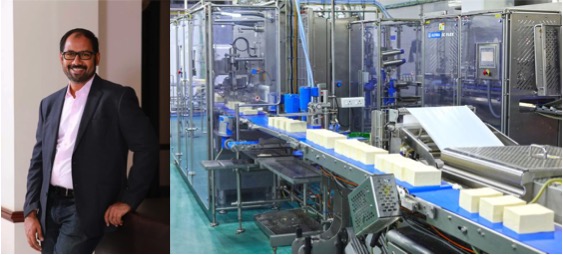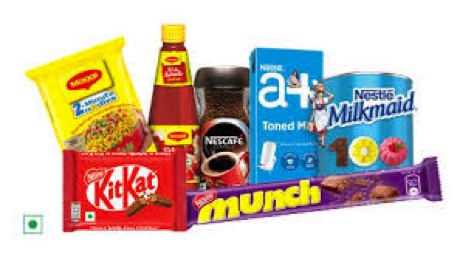Glistening white blocks of fresh paneer (cottage cheese) come hurtling down a conveyor belt, met by robotic arms that slice the blocks precisely into half kg chunks. Another arm quickly pushes out the paneer slabs that are not the correct size and weight into a drum before the next right-sized chunk comes along — all at bewildering speeds — and is packaged in a Milky Mist branded tub. The tubs are then stacked in boxes ready to be sent out in refrigerated trucks to retail shelves. Elsewhere in the cavernous dairy floor, paneer is being sliced into small cubes to be packaged and sold as frozen paneer.
This sprawling, highly automated dairy of milk processing major Milky Mist is set amidst vast green fields in a verdant belt of Erode district in Tamil Nadu. Apart from humungous quantities of paneer, the dairy churns out a variety of over 20 products and over 350 SKUs, mostly under the Milky Mist brand. In different sections of the dairy, one can see ghee, cheese, fresh cream in cartons, buttermilk, milk shakes, Greek yoghurt, protein enriched curd under its Skyr brand, ice cream, chocolates under the Capella brand and more are being produced. “We process close to one million litres of milk per day sourced from around 70,000 farmers spread over 12 districts,” says T Satish Kumar, the self-effacing founder and managing director of Milky Mist and the ‘pioneer of paneer’ in the South. From producing 50-60 tonnes of paneer a day, the plant is scaling up to produce a whopping 100 tonnes of paneer a day!
Farm to factory
The gleaming edifice of steel vats, miles of steel tubes, robots and a vast fleet of refrigerated trucks with Milky Mist emblazoned on them waiting for dispatches from the dairy, is a far cry from the humble beginnings of Satish Kumar. Hailing from an agriculturist family in Chithode, a neighbouring town, his father traded in milk, sending it to Bengaluru. In 1991, at the age of 17, Satish quit his studies to join the milk trading business.
One day, Satish took away large quantities of milk to try and make paneer. When his father returned in the evening, much to his horror, he found that Satish had diverted some 400 litres of milk to make paneer in a rudimentary way. He thought Satish had spoilt all that milk. “No Google or YouTube videos those days to learn,” he says wryly. He had learnt that hotels in Bengaluru wanted good quality paneer and he saw in that a good market to value add to the milk they procured.
Today, paneer is ubiquitous in the South, but in the early 1990s, it was a low consumption and novelty product. Only some hotels and large department stores in Bengaluru stocked it. In 1997, when supplying the erstwhile Foodworld supermarket chain, the purchase manager asked him what his brand name was. “I had no idea what a brand name was. We went to a browsing centre and searched 10-15 names and selected Milky Mist. But at that time, I did not have any vision. We just gave a brand name for the market,” he explains.
For the next decade or so, Milky Mist trundled along supplying two to three tonnes of paneer to the southern market but slowly local consumption picked up. “Like the white revolution, we created a paneer revolution in the South,” says Satish Kumar proudly. But he was a single product company with a semi-automated plant. A visit in 2009 to a dairy trade fair in Hanover was a game changing moment for him as he saw the possibilities that automation offered. He later invested in a fully automated plant at the present site and expanded the Milky Mist offering to curd, yoghurt and cheese. “We realised we couldn’t build a cold chain by being a single product company,” he adds.



























